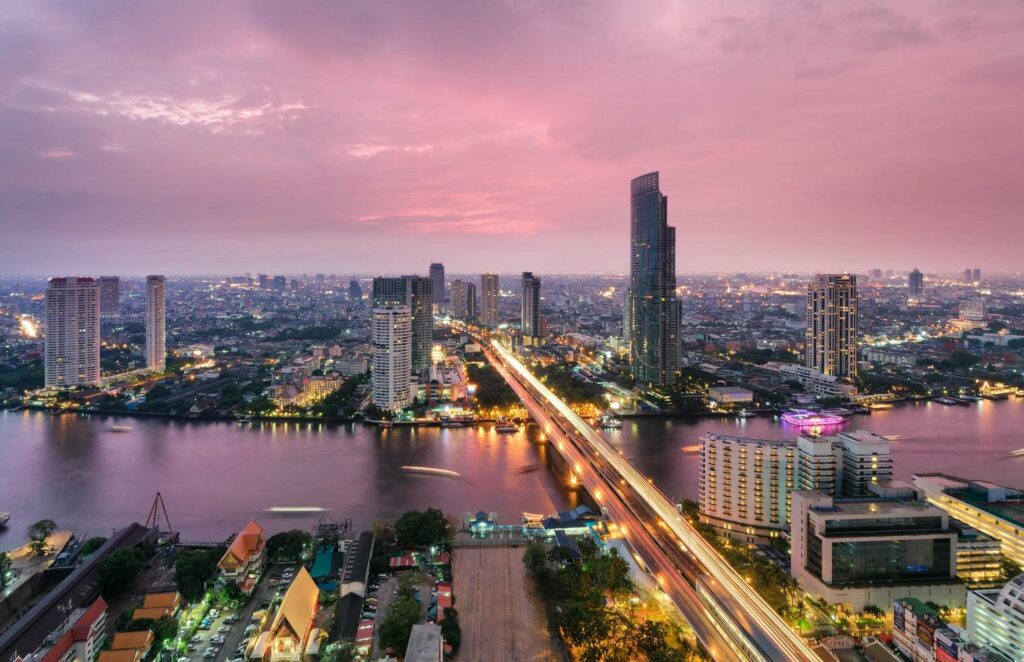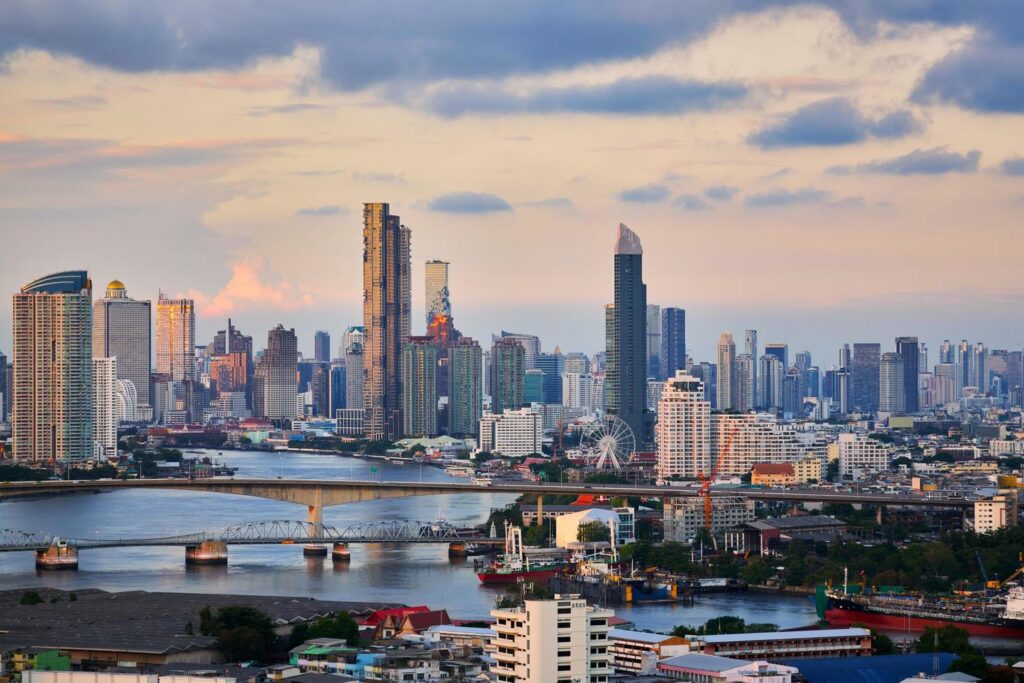Best International Health Insurance Companies For Expats in Thailand – that will be the topic of today’s article.
Before introducing this article, if you are interested in our core services which are expat financial, insurance and mortgages, you can contact me here.
The best time to consider your financial situation is when you are moving to a new country.
Introduction
As an expat living in Thailand, finding the best international health insurance company can be very challenging. This is due to the fact that the insurance industry in Thailand is big and highly competitive. Besides, the local and offshore insurance companies and several banks also offer insurance policies.
When it comes to insurance, it’s a business of trust. And when you buy this insurance as an expat, you need to make sure that the insurance company actually pays your claims. So, the insurance company needs to have both a good reputation and financial stability. Aside from that, you’ll make sure that the policies they offer you fit your need and budget.

However, to help you find the right match, we’ve compiled the best international health insurance companies for expats in Thailand. Although health insurance is not quite popular in Thailand, especially for Thais, and this is because they’re covered with Social Security insurance by the Thai government.
If you’ve been surfing the internet to get the right international health insurance company, you’ve come to the right place. We offer expatriates a wide range of health care plans suitable for both expats and Thai nationals residing in the country. Moreover, our plans are designed to ensure excellent coverage.
Guess what! We will walk you through the benefits of having health insurance in Thailand. Not only that, but you’ll also know how much it cost an expat. I’m sure you’d love to know more about this international health insurance and all that it entails? If that sounds like a yes, read further for the details.
Understanding Health Insurance in Thailand

If you’ve moved to Thailand, you can rest assured that you’ll be well taken care of when there are any medical emergencies. This is due to the fact that the healthcare systems, as well as public health insurance in Thailand, are both of excellent quality. In fact, you can use this to avoid waiting times.
And for those who wish to have access to a more seamless healthcare experience, the private sector of Thai medical insurance is always an option for emigrants. Moreover, this kind of health insurance is different from the Thailand travel insurance that covers tourists and visitors only for travel-related events.
Now, expats in Thailand have the following options for health insurance, depending on their resident status. Without further ado, let’s quickly check the concept of public Thailand health insurance for working expats and private health insurance in the country.
Thailand Health Insurance for Working Expat
This program is meant for expat who are currently employed in Thailand. And this expat must have enrolled in the Universal Coverage Scheme (UCS) that provides free healthcare through contributions but deducted from the employee’s salary.
Thailand Private Health Insurance
Foreigners who are not employed or those who want health coverage in private hospitals can purchase this private medical insurance scheme, either local or international. In addition, expats who retire in Thailand will have to subscribe to a private insurance plan or pay the costs from their own pocket. Continue reading to see the list of the best international insurance companies we’ve unleashed for you.
Thailand Public Health Insurance System
Undoubtedly, working expats in Thailand will definitely have access to free public healthcare through contributions to the Universal Coverage Scheme (UCS). Aside from this fact, all workers in Thailand contribute 5 percent of their salaries to the Thai social security scheme to cover their insurance.
Meanwhile, when you enroll in the public healthcare system, you will be assigned to a hospital, in which you’re likely to receive free treatments. So, if you go to another hospital in the long run, you’ll have to pay with your own money. In no time, take a look at the benefits of public health insurance in Thailand.
- Medical services in Thailand are of good quality since the doctors in public hospitals are highly skilled.
- Expat doesn’t have to pay anything extra, as your contributions to social security cover it.
- Using the public health insurance system in Thailand is just like showing your insurance card to the hospital staff
- The average international Private Medical Insurance (IPM) premium for expats in Thailand is roughly $2,000 per year, while the IPMI premium amounts to $10,000 for families.
- Thailand’s healthcare system was once ranked sixth in its 2019 list of countries with the best healthcare system.
5 Lessons from Thailand Healthcare Coverage
As of today’s 21st century, Thailand’s Universal Health Coverage (UHC) scheme has led to dramatic improvements in various health parameters, including infant mortality rates and life expectancy. With that being said, expat moving to this country would enjoy good healthcare and insurance facilities. More so, we’ve compiled the five lessons from Thailand’s healthcare coverage for expat to know better.
1. Use the Right Strategy
The Thailand government has been doing wonderful by having one of the best healthcare systems in Asia. This aided in curbing the cost escalation and improving the quality of care for both locals and foreigners. Moreover, for ease of monitoring, the country has leverage technology extensively.
2. Dare to Innovate in Thailand
Thailand’s innovative policy that dealt with generic medication production has continued to increase in recent years. As a low-middle-income country, Thailand’s innovation in the healthcare system has become an inspiration for both developed and developing countries, seeking to improve the health outcomes of their citizens at a controlled cost.
3. Extensive Geography Reach
There are tons of factors that have worked in favor of the country’s UHC. And the most important one is, arguably, the extensive geographical reach with the functional primary healthcare system. The successful Thailand government has invested in the health workforce and infrastructure to ensure long-term sustainability and assurance. Moreover, the policymakers came up with amendments to attend to more patients, locally and internationally.
4. Affordable Healthcare Insurance Policy
Developing nations like Thailand have improved immensely when it comes to the healthcare system and insurance policy. Using evidence-based decision-making policy, expats would definitely enjoy the affordable healthcare system. This way, many policymakers can adopt the method to improve access and equity.
5. Insurance Eligibility Coverage
Thailand’s social security program is among the healthcare options for expat. Besides, expat not covered by social security should obtain private medical insurance programs to cover their medical needs and emergencies. Meanwhile, short visitors like tourists to Thailand can get private travel medical insurance to keep them from being out of pocket for medical expenses.
Top International Health Insurance Companies in Thailand

With Thailand gaining recognition for its healthcare system in recent years, the benefits of relocating to this country cannot be overemphasized. If you check our previous post, you’ll get a glimpse of what living in Thailand entails. On the flip side, we’re here to walk you through the best international health insurance.
Cigna Global International
Cigna global international is one of the most affordable international insurance companies in Thailand. While they are comparably cheaper, this company does provide some great insurance options and excellent customer service. Aside from this fact, they offer a modular plan design that allows foreigners to tailor their plans to their needs and budgets.
In recent years, they introduced Cigna Global Health Thailand, tailored to provide a quality healthcare system for expats living in the country. Aside from health insurance, they also offer travel insurance, personal accident insurance, and critical illness insurance.

Dhipaya Insurance Company
With research and proper methodology from an experienced expat living in Thailand for over six years, Dhipaya has emerged as one of the largest insurance companies in the country. They provide endless insurance facilities for both locals and foreigners. Additionally, Dhipaya offers a wide range of other insurance types, including personal accident insurance, health insurance, property insurance, and others.
Luma Health Insurance Company

Among the top ten insurance companies in Thailand, Luma also made it to the list. They offer a wide selection of health insurance, including family and company plans and individual plan. Aside from that, their comprehensive health insurance includes inpatient care, cancer care, and even maternity care. On top of that, the Luma health insurance also offers excellent benefits, including member privileges and social-medical options from your in-house expat foreigner. Additionally, they provide COVID-19 insurance to enter Thailand and travel insurance, providing great medical coverage.
Furthermore, Luma also promotes prevention aside from covering your medical bills. Again, they educate their members on how to look after themselves and maintain cleanliness and healthiness.
Pacific Cross Health Insurance Company
For emigrants looking for an affordable international healthcare insurance company, look no further as Pacific Cross is the right option. One of the best things about this company is that they have an expat department, so clients who can only speak English are well-taken care of. Not only that, but they also provide worldwide assistance for their members.
This international health insurance company is also an excellent choice if you prefer cashless claims. In fact, they have about 300 network hospitals in Thailand and a few across Southeast Asia. Therefore, make sure you compare their services with others if you want to pick the most affordable one.
NZI Healthcare Insurance Company
NZI Health insurance company has made it to the top of our list. It’s a company that operates under Safety Insurance, and it’s one of the biggest insurance companies in Thailand. They offer world-class coverage service provided by two of the world’s largest insurance groups. While they can have a local English and Thai-speaking team for your convenience, they take policyholders up to 74 years of age. Also, their price may be high but they do have excellent coverage and world-class service.
MSH International Health Insurance
MSH has a good reputation, and this is because they’re among the leading insurance companies in Thailand. If you want the gold standard of insurance as an expat, MSH is definitely what you should go for. As an international company, they have different language speakers that would assist you no matter where you come from.
On the flip side, the MSH international health insurance has higher premiums while they maintain a good track record and also offer cashless claims in some selected Thailand hospitals. Also, they have full cancer cover under all plans with no restrictions and caps. Again, expat will have the freedom to choose the treatment they want, whether in Thailand or any country of your coverage.
Bupa International Insurance Company
The name ‘Bupa’ is among the international health companies in Thailand. Research also made it known that it’s impossible to check out the best international health insurance companies without mentioning the Bupa firm. They specialize in different insurance programs and policies, including illness/accidents, healthcare gain, and many others, to mention a few. While people consider Bupa as the most expensive, they offer plans that range from budget to premium.
Challenges Faced by Thailand’s Healthcare Insurance
Compared to Singapore, which has one of the best healthcare systems in Asia, there are many challenges faced by Thailand’s insurance policy. As impeccable as it may seem, the Thailand international health care system is faced with many concerns. Without further ado, here are the challenges as of 2021.
Aging population in Growing Economy
The surge in the aging population, longer life expectancy, and the decline in the working population has put enormous pressure on Thailand economy and its healthcare/welfare system. If this trend follows, Thailand might have the highest shares of elderly people among East Asia and the pacific.
As for the decline working population, the report predicts that there will be a 10 percent decline in the working population by 2040. This means elderly citizens are more likely to develop chronic diseases such as diabetes, high blood pressure, and more. So, in due time, the aging population can affect expats.
Increasing Financial Pressure
This factor, inclusive, is among the major challenges faced by Thailand’s healthcare system. And it has made more people question the sustainability of the Thai healthcare system. However, these pressures do not stem only from long-term care expenditure for the aging population but also emerge from the diminishing general tax revenue in Thailand.
Increasing Healthcare Costs
The increasing healthcare cost is another factor that has increasingly impactful worldwide and shows no signs of abating to that Thailand system. While medical breakthroughs allow for better effective treatments, they typically require large capital injections for relevant medicines as well as equipment. So, increasing healthcare costs could also hinder the effective healthcare system in the country.
Top 7 Tips on Staying Healthy in Thailand
While Thailand is an excellent travel destination for expat and near the top of many people’s travel bucket lists, it’s essential to consider the various health risk concerns before jumping on an airplane bound for paradise. In no time, below are the top seven tips on staying healthy in Thailand today.
Before Travelling to Thailand
Fortunately, Thailand is relatively safe to travel for an expat. And, if travelers are sensible, there’s no reason why the majority of health issues and safety concerns cannot be avoided. While it is normal for travelers to worry about contracting the COVID-19, safety precautions should be taken into consideration. When you travel to Thailand, it is suggested that you consult with your General Practitioner.
Routine Vaccination
Whether you’re traveling to Thailand for business, for leisure, or whether you’re a long-term expatriate worker, vaccinations should be among the essential aspect of your pre-travel preparation. This will ensure that your health is protected from coronavirus and other health risks while traveling around the Land of Smile.

Prepare your Yellow fever Certificate
Always know that there’s no risk of yellow fever in Thailand, but a yellow fever vaccination certificate is required by the Thai government for travelers older than nine months of age. This means a yellow fever vaccination is also needed for travelers who have transited longer than 12 hours through a country’s airport with the risk of yellow fever transmission.
Take Antimalaria medication to infected Areas
If you’re moving to this country for the first time, we advise you to take antimalaria medication if you’re heading to infected areas. While the majority of Thailand, fortunately, has low to no risk of malaria, there are others areas of the country that are of higher risk. Therefore, when you’re planning to travel, it’s obviously recommended that you take the prescribed antimalarial medication.
Stray Away from Stray Dogs
Due to the high prevalence of street dogs and wild monkeys in some parts of the country, it is also best to avoid contact with animals to minimize the risk of contracting rabies. Moreover, if rabies is left untreated, a bit of medical advice is to sought-immediately after any animal bite or even a lick from an infected animal.
Always Use a Sunscreen
Sun exposure is also a crucial thing for expat to be mindful of. Also, sunscreen and constantly reapplying is essential when island-hopping, swimming, snorkeling, or just sightseeing around the various cities. Aside from this fact, but covering up exposed skin with loose clothes, hats and sunglasses will also help with sunburn while living in Thailand.
Stay Well Hydrated and Carry Layers
Another tip to avoid heatstroke while traveling is to stay hydrated. When you’ve landed in this country, ensure that you drink plenty of safe drinking water to prevent swelling of the feet and ankles, excessive sweating, and muscle cramps due to strenuous activity in the heat of the day. Aside from this fact, carry layers with you to protect from air-conditioning and keep your body warm or cool.
Frequently Asked Questions about Health Insurance
Is healthcare in Thailand good?
Of course, the healthcare system in Thailand is undoubtedly good, especially in Bangkok. In fact, many doctors and other specialists speak English, but the standard of the healthcare system deteriorates considerably in rural areas. However, one peculiarity of the system which expats might encounter is that it’s often easier to find a specialist than a GP.
What Should I avoid in Thailand?
As an expat, always know that you’ll be spoiled for choice during your visit to Thailand. This is because; there’s so much to do. On the other hand, there are many things to avoid as a foreigner moving to this country for the first time. They include; swimming at the southern Andaman, hiring a motorbike, going to a tiger or animal shows, riding an elephant, overstaying your visa, arguing with Thai police, and more.
Is Bangkok safe to walk around at night?
Undoubtedly, Bangkok is safe to walk around at any time. On the flip side, be wary of the things to avoid while living in the country. But, you’re covered by the uniform men if you follow the right part to your visa application and when you have a valid passport.
Is Bangkok safe for female tourists?
Just like we said earlier, Bangkok is definitely safe for travelers of all genders and even compared to other megacities across the world. As a female traveler, you can wear almost anything you want, roam the city on a whim, and even go clubbing on your own.

What can I wear in Thailand?
The basic rule is to cover your shoulders and knees. Aside from that, you can wear anything you feel comfortable within Thailand. On the bottom, wear long shorts, capris, or a knee-length or longer skirt. For more information about what to wear in Thailand, you can refer to our article about living in Thailand.
What does it cost to see a doctor?
Well, in Thailand, you should expect to pay around 300 to 500 baht per outpatient visit when going to a government hospital. However, it would be better to apply for health insurance as this would likely cover your bills in the country. Meanwhile, be expecting to pay up to 1,500 to 2,000 baht if you visit a private hospital.
Conclusion
There are more than a few ways to enjoy Thailand as an expat. We have explored the safety, health insurance, and expat guide to help you move to the country with ease. So, would you love to know more about the living or relocation process to Thailand? Well, it’s high time you read through our previous post!


